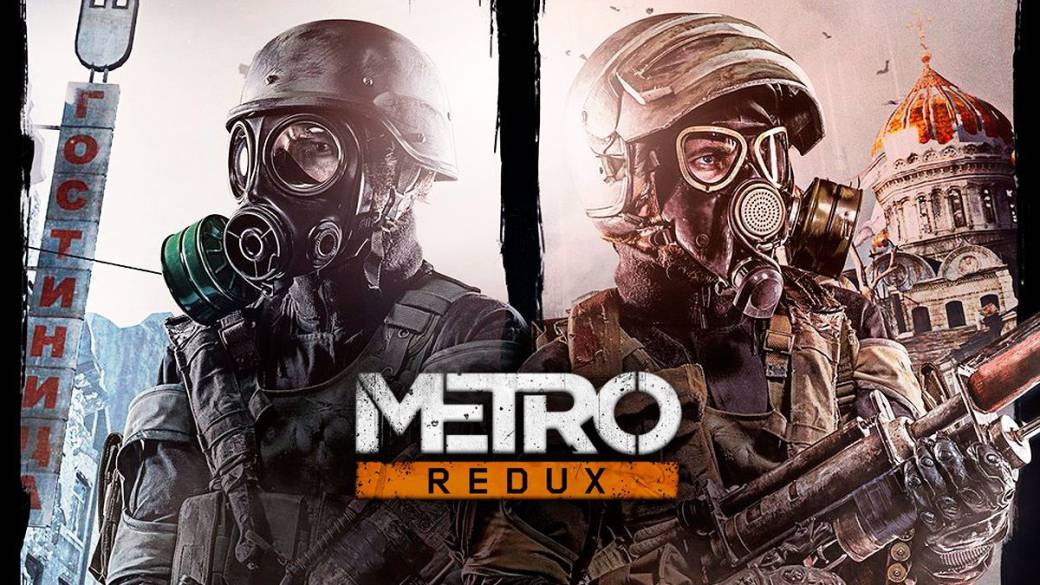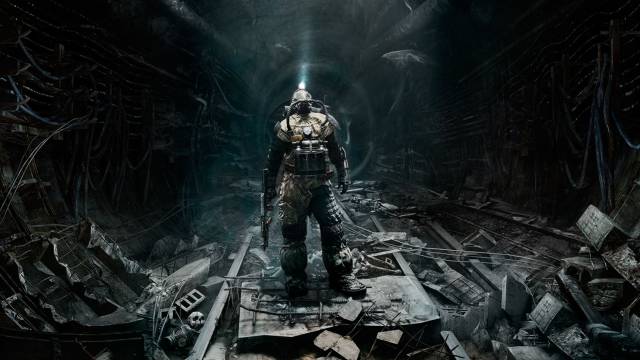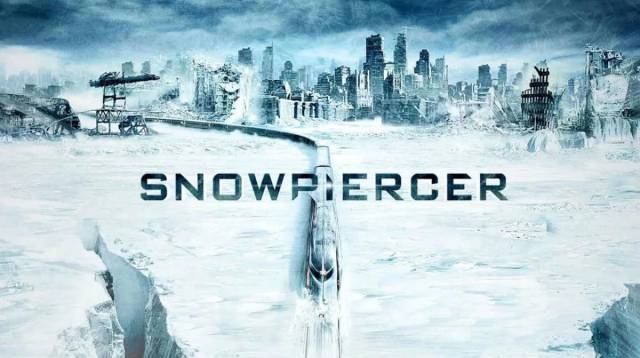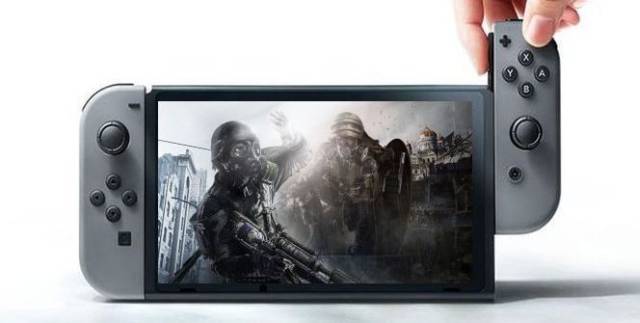
We analyze the Metro Redux port for the Nintendo hybrid console. Metro 2033 and Metro Last Light arrive on Switch with their strength and personality intact.
Being two games, Metro 2033 and Metro Last Light, which were analyzed here at the time and the same was done with the Redux version that collects them remastered a few years later, we encourage readers to revisit those works. Having said much of these magnificent games, the intention is that this text is complementary and not redundant. They will reread here the benefits of both titles told in a different way, and they will be able to look at books, the creation of games or their lines of escape with the seventh art. Prepare your masks, check the functionality of your air filters Does the geiger counter work correctly? Perfect, they are ready. Hold on, the subway starts up.
Stop 1: Metro 2033 the book, of the first ideas pointed out in secondary to mass phenomenon
Dmitry Glukhovsky worked for years on his novel Metro 2033. He took the first steps as a kid, outlining ideas and, already in college, writing the first chapters. After the rejection of the publishers, the young author turned the writing into a public work in progress. Advances were turning on the internet, gradually turning those ideas into a phenomenon on the web. With more than two million people reading Artyom's story on their computer screens, he received several offers to take to bookstores. In 2005 Metro 2033 arrived at the Russian shelves. Millions of copies have been sold today and translated into dozens of languages. It has become a successful book saga with the collaboration of other authors and expands beyond the printed pages in the form of a fantastic trilogy of video games.
In 2006 Glukhovsky relied on 4A Games to make the story interactive. What this, at that time, small and humble Ukrainian video game development team achieved, was a tremendously faithful recreation of the work of the Russian writer. The first game, 2033, does justice to the novel of the same name with passion and respect; His successor Last Light disregards adapting 2034, the second book, but has the direct involvement of the author in the numerous dialogues. Both titles maintain the benefits of paper counting; they almost magically reflect the darkness, the cold, the humidity and the fear, but also the demanding life underground that tries to keep a certain organization afloat so as not to fall apart, the battered humanity of its suffered inhabitants and the difficult relations between them. Knowing the harsh conditions in which 4A Games developed those video games helps to understand why everything was so well reflected on the screen.
Stop 2: Metro Last Light, the game that emerged from the cold
4A Games was founded by members of GSC Game World who had left the company a year before the launch of STALKER: Shadow of Chernobyl, a recognizable reference when looking at what they would do later with Metro 2033. The playable adaptation of the homonymous novel It went on sale in 2010 for PC and 360 reaping excellent reviews. Metro Last Light did the same three years later. In the development of the second title is where Jason Rubin comes into play.
The famous co-founder of Naughty Dog had landed as an executive in 2012 on a THQ that was already mortally wounded. He dedicated himself to visiting the teams that developed games for the distributor, and that is how he arrived in Kiev, at the workplace of 4A. According to his words:
The entire 4A study would easily fit in the gym (underutilized) in the offices of EA Los Angeles.
It was obvious how tight your budget was,
Less than what some of your competitors spend on cut scenes, a mere 10 percent of the budget of their biggest competitors.
The famous executive was impressed to see them work in those conditions:
4A staff sat in folding wedding chairs, literally side by side at the game tables in what looks more like a cafeteria full of elementary school than a development studio.
Rubin tried to improve the conditions of the team by getting them professional work chairs. As it was impossible in Ukraine, it was decided to buy them in Poland. The problem was that steps had to be made for the truck to pass the filter of bribery customs officials through. In the end the operation was discarded because, literally, the chairs would not have fit in the offices of the studio, where they already worked in a very limited space.
The stories kept surprising Rubin, like those who talked about failures for days in the electricity supply that were remedied by bringing private generators, or in poor government heating, which sometimes forced them to work at freezing temperatures, with their parkas , crowded and hunched over trying not to freeze their fingers while typing the valuable code.
Deeply impressed, in 2013, with the game triumphing between critics and audiences, Jason Rubin told all this in Game Industry.
Although any player can enjoy Last Light without the backstory, I think the backstory makes it much sweeter (…) If you care about the art of playing games, then you should worry about something more than the final product. The fight and the journey become part of the story. Like sport, you encourage when the helpless comes from behind and triumphs before incredible odds.
As it is sadly known, THQ broke down leaving orphan and, luckily, several development studies (including a Spanish one, but that is another story). Fortunately, Koch Media won 4A Games, deriving uncertainty towards a happy ending.

Stop 3: The Metro narrative, a strong point not without any weakness
Metro is an atypical first person shooter. You will not find in this saga reminiscent of Call of Duty, Borderlands or Battlefield, where the bombastic and frantic rules. It is an experience for a player. Its powerful and leisurely narrative component brings it closer to Halflife or Bioshock, and an approach to action that at many times asks you to be stealthy and creative in choosing different routes would create bridges with Dishonored and Deus Ex. Darkness, the management of resources in a very hostile environment and the presence of tremendously aggressive monsters often makes it a survival horror. Metro squanders a personality that distances it from those distinguished names, to the point that you put for the first time any of its titles having played a previous one and the feeling you perceive is, undoubtedly, “This is Metro”.
His deep lore soaks the surroundings. In the settlements there is a story to hear behind each corner, behind each door ajar. You hear someone crying crouched in a dark corner, a child asking when he will see his mother again, the cry of a baby in the arms of a defeated woman, the memories of an almost forgotten world told in the heat of a bonfire.
On the surface sometimes the echoes of the past are revealed to you. A ruined park suddenly transforms into what it was. The light fills everything, like the colors of the swings, the laughter of the children … But you cannot mislead yourself with mirages. The urgency of checking the duration of your air filter is always present. You have tried to bring down a lone bug but this one has been able to call his fellow beings before he fell dead. Soon you are shooting a whole crazy pack. After the skirmish, your gas mask shows cracks, and the wasted time causes the filter minute to flash. You feel more terror at that time than before. You start looking for spare parts running through the ruins and registering the half-broken human bodies that you find scattered. All while from time to time the broken sound of the geiger counter reminds you that radiation is one more enemy, one you can't beat.
The monologues that make the characters that accompany us give consistency to the game world. Thoughts, desires, doubts are shown. Here they have an excellent sample in the following video. It belongs to the version of Last Light on PS4, but what you will find on Switch is the same. It is interesting to show in this case the excellent narrative.
The only one but it is precisely that they are monologues and not dialogues. Artyom, the protagonist, is mute following the trail that Link marked in Zelda. That is supposed to create direct ties with the player as it does not articulate words that do not come from our lips. But Artyom does speak. Every time a phase begins it shows us his thoughts. We also have them in writing in a newspaper that you fill in throughout your journey. It is an incongruity, but as you will understand, it is not a minimum counterweight to shake your mountain of virtues.
Stop 4: The Metro saga and the cinema
There has been a tug of war for years with Hollywood to turn Artyom's journey into a movie. It came to a standstill in this field when the Americans insisted on moving the action from the basement of Moscow to that of Washington. They haven't heard anything, Glukhovsky must have thought, who flatly rejected the idea. And it is that Metro assimilates so much to the idiosyncrasy of Russia and its bordering countries that the original novel would be totally distorted.
It is curious that it was a Spanish film, The Last Days (Alex and David Pastor, 2013), which moved certain ideas from the novels and the visual power of the games to the big screen. In the film humanity suffers worldwide from agoraphobia. Going out to open spaces means death, so staying at home and indoors is the only way to survive. The Metro becomes the refuge of thousands of people, and the images are powerful reminders of what was seen in video games. Despair, rationing of food, darkness, humidity, cold, long walks through the tunnels, the fire used again for survival. The similarities are rounded up by that trip from A to B of the protagonists.
And from A to B they also walk in 1917 (Sam Mendes, 2019). The similarities come in this case from the hand of the narrative. The prominence shared between two characters at the beginning of the film is a handle for the viewer. Do you remember that one of the things that did not just work in the Silent Hill film adaptation was the loneliness of its protagonist? This was just repeating again and again the name of his daughter, whom he was looking for. In the game loneliness works, in games in general, go. It's us and the command, no more is needed. In a story in which we are mere spectators, we must do it very well so that silence works. In Silent Hill, perhaps for lack of security, the protagonist spoke alone doing the only thing she could do, call her daughter. Thus, the dialogues along the way in 1917 perform the same function as in the games. In the books the pages can be filled with the description of the trip itself, in the movies and games the conversations give us information about those who articulate them and the world itself and the surrounding context. And there are few that live up to the Metro trilogy in this regard.
For the rest, we like to think that Metro Exodus is a spiritual continuation of Snow Blowers (Snowpiercer, Bong Joon Ho, 2013). That in that film, (by the way, one of those that best adapts the language of the video game to the cinema) in which a train moves perennially through a frozen planet Earth, the award-winning director of Parasites chose another ending in which the train continues its course for a world that begins to be habitable again.

Stop 5: The port of Switch. You can now play Metro traveling in the subway
As usual in the gaming ports of the PS3 / 360 era to the hybrid console, the result is magnificent. Recall that both 2033 and Last Light were very technically leading at the time (they pulled their own motor, too), although time does not pass in vain. The Redux version with the remastered titles, which is the one that has reached Switch and did the same on PC, PS4 and Xbox One in 2014, updated Metro 2033 and further enhanced Last Light. Both look scary on the Nintendo machine, and although they do not reach the resolutions of the major consoles, it reaches 1080p in dock and secures the 720p in portable, also running in more than stable and robust 30fps.
They can be purchased separately in the eShop, which will force them to make a hole in the memory card of the console (6'2GB for 2033 and 7'6GB for Last Light) or physically on a 16-gigabyte card where you will not need downloads additional beyond the corresponding updates. Taking into account that these are continuous titles, both are absolutely recommended. Last Light polishes what was seen in 2033 and, although it is not essential, it is highly recommended to enjoy the beginning of the story to know what is hidden behind the dark ones. The Spanish dubbing is of quality, and it is a pleasure to hear again the same voice of Artyom when one jumps from one game to another (and that we met again in Exodus, the magnificent third part published on PC / PS4 / One) . Of course, the loading times at the beginning of each phase are scandalous compared to those of older machines. We want them to be optimized based on future patches.

For the rest, know that Redux includes all the extras that came out separately at the time for Last Light. The additional phases and the inclusion of a museum where the creatures can be admired without fear of jumping to your neck are taken. As you still want to overdo it, you can choose to replay it at a higher level of difficulty or in a different way. In the latter case we recommend making a first game in Survival mode, more focused on survival horror and that was conceived as the original experience and, in a second round, jump to the Spartan, more action-oriented and without the scarcity of resources of the other (weapons, filters, ammunition …). Metro Redux is therefore highly recommended if you have not played it before, and for those who do, it is an incentive to enjoy the experience in portable mode, helping in addition to the movement control in the targeted. Well, we leave you, we have already reached our stop. Here we get off, enjoy the intense journey that awaits you.
CONCLUSION
Metro Redux is an excellent port on Switch. Metro 2033 and Metro Last Light offer us here the same experience as always, intense, solid, tense, demanding, focused on survival horror, with an unforgettable narrative in many moments. Metro has personality, and its interesting world is far from what other shooter usually offer. Being able to play it on a laptop tuning the aim of motion control makes it a unique option if we compare it with the other versions. A little that appeals to what it offers is an essential proposal.
THE BEST
- The first two Metro remastered in all its splendor
- A port at the height
- Be able to play them in portable format and fine-tune aiming by motion control
- His narrative and his world, tremendously evocative and forceful
WORST
- Load times longer than on other platforms
- Some incongruity in a mute protagonist … who speaks at the beginning of each chapter
- That he does not like his basic proposal: a player, pasillero, dark and with quiet moments in which to soak up his world and the people who inhabit it
Very good
Remarkable game that we will enjoy and remember. A good purchase, highly recommended for lovers of the genre. It is well taken care of at all levels.
